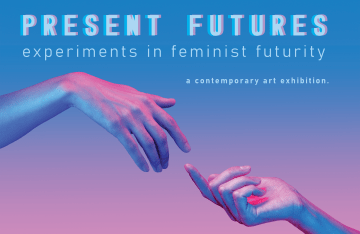
Present Futures: Experiments in Feminist Futurity
- The Forum at the Annenberg School for Communication, 3620 Walnut St., Philadelphia
A contemporary art exhibition envisioning feminist solidarities across space and time, in everyday life, with an outlook towards “the future we want to see, right now, in the present”
“Present Futures: Experiments in Feminist Futurity” will open the two-day Transnational Feminist Networks Symposium from September 12-13, 2024, at the Annenberg School for Communication at the University of Pennsylvania.
The exhibition will be on display in the Plaza and the Forum of the Annenberg School during the fall semester. The exhibition opens on Thursday, September 12, and closes in November.
Exhibition Inspiration
In recent years, popular mobilizations like #MeToo, the traveling protest chant ‘Un violador en tu camino,’ and the International Women’s March have contributed to a global feminist resurgence. These moments of heightened visibility inspire, uplift, and illuminate pressing concerns facing women and gender-diverse individuals around the world but often eclipse the ongoing work at the grassroots level amidst seemingly insurmountable odds. Present Futures: Experiments in Feminist Futurity aims to highlight the undercurrents of popular feminisms — the acts, rituals, and practices that sustain transnational feminist solidarities and networks of care.
Beyond a sense of hope for a future we’d like to see from the top-down, our exhibition is inspired by Tina Campt’s proposal for a “grammar of black feminist futurity” that attends to the undercurrents of futurity evident in the present, the everyday, and the quotidian. She describes this revolutionary grammar (in the future real conditional) as a performance of a future that has not yet happened but must. Present Futures invites artists to meditate upon the quieter registers of feminist futurity that we can begin to imagine, live, and embody in the present.
Selected artworks interpret the quotidian practices of the everyday as a means of consistently cultivating radical feminist knowledges, sustaining networks of care, and articulating communal resistance, within and beyond territorial borders, in often unspectacular and unglamorous ways.
The exhibit's curatorial team is Cienna Davis, Lucila Rozas Urrunaga, Simron Gill, Valentina Proust, and Azsaneé Truss.
Selected Artists
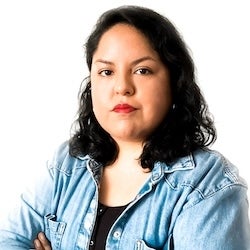
Andrea Sifuentes Hernández
Andrea Sifuentes Hernández is a queer Peruvian multidisciplinary artist who graduated from the Faculty of Art and Design at the Pontifical Catholic University of Peru (PUCP). In her artistic practice, she focuses on the analysis and reconfiguration of archives, as well as exploring her identity as a queer Latin American woman. She addresses the boundaries between individuality and collectivity in everyday social dynamics and their relationship with consumer society. Her artistic proposals aim to reveal, rethink, and reverse the various mechanisms and discourses that foster inequality and violence in mass consumption devices. Through her multidisciplinary approach, Andrea Sifuentes Hernández delves into the complexities of identity and cultural narratives, using her art to challenge and subvert established norms. Her work invites viewers to question the societal structures that perpetuate discrimination and to engage in a dialogue about the power dynamics within consumer culture.
Azsaneé Truss
Azsaneé Truss is a Philadelphia-based thinking artist who seeks to build worlds and imagine liberatory futures through her artistic practices. She works in a variety of mediums including collage, movement, and sound, often playing with Afrofuturist and Afrosurrealist aesthetics. Drawing inspiration from literature, quotidian Black life, and her research, while also embracing fluid inspiration, Truss’s collage art is an exercise in conversing with the archives, speculation, re-memory, and personal exploration. Her collage work has been featured in Philadelphia’s Parkway Central Free Library, at the University of Pennsylvania’s Screening Scholarship Media Festival, in Philadelphia’s City Hall, and in small exhibitions in Los Angeles and New York City. As a PhD Candidate at the University of Pennsylvania’s Annenberg School for Communication, Truss also deeply engages multimodality in her scholarship. In line with this commitment, she has given lecture-workshops titled “Collaging as Multimodal Praxis” and “Using Multimodal Forms to Radically Imagine New Futures” to encourage students to consider the types of knowledges they can access by using modalities outside of the written word.
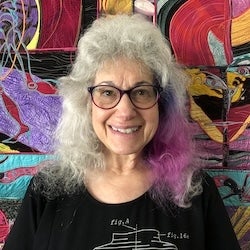
Barbara Schulman
Barbara Schulman holds a Master of Fine Arts degree in Fiberarts from Kent State University in Ohio. She has exhibited woven, embroidered, and mixed-medium textile constructions throughout the United States and in France, Canada, the Philippines, and in the Art in Embassies Program of the U.S. State Department in Azerbaijan and Brunei. She has taught workshops on weaving, non-traditional needlework and quiltmaking and has lectured on Contemporary American Textiles in England, Scotland, Ecuador, and throughout the United States, including presentations for the Pennsylvania Humanities Council Speaker’s Program. She was head of the Textiles program at Kutztown University for 19 years.
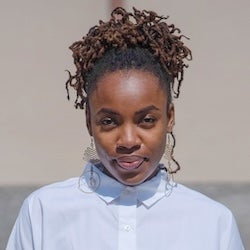
Cienna Davis
Cienna Davis is a Black feminist community organizer, cultural worker, and doctoral candidate at the Annenberg School for Communication of the University of Pennsylvania. She earned her BA in Ethnic Studies and Communication from the University of California San Diego and her MA in North American Studies at the Freie Universität Berlin. Davis co-founded the diasporic Black feminist collective Soul Sisters Berlin, where she organized events, performances, hair workshops, discussions, and art retreats to educate, empower, and connect Black women in Berlin. These experiences form the basis of her dissertation research on transnational Black feminist networks. She utilizes performance ethnography to engage Afro-textured hair as a language and communication network facilitating tactile connections between Black femmes of the diaspora. Her writing and speaking on Afrofuturism, Black feminism, colorism, digital blackface, popular culture, hair, and community organizing have been published in academic journals, magazines, books, edited collections, and newspapers in the US, Germany, Switzerland, and Korea.
Lucila Rozas Urrunaga
Lucila Rozas is a Ph.D. student at the Annenberg School of Communication at the University of Pennsylvania. She also holds a MSc in Sociology from the University of Amsterdam and a BA in Political Science from Pontificia Universidad Católica del Perú. Her research focuses on the transnational circulation of subjugated knowledges (ideas, affects, practices, and discourses) among feminist publics, specifically those emerging from South America. Her most recent project engages in multimodal critical discourse analysis (MCDA) and other qualitative methods to look at how the feminist affects of the Ni Una Menos movement stick to certain "objects," how they are digitally mediated, and what enables their multi-sited circulation. She also explores how to insert artistic practices into her research by engaging in video work, performance, and creative writing.

Okyoung Noh
Okyoung Noh (b. Seoul, KR) is an interdisciplinary artist based in Ann Arbor, MI, and Seoul, South Korea. Through installation, performance, social practice, and film, Noh's work maps the violence and resistance witnessed by displaced Asian female migrants' bodies. Her works have been presented internationally at Wave Pool Gallery, OH; Ann Arbor Art Center, MI; Athens Institute for Contemporary Art, GA; Duderstadt Center, MI; TriBowl, South Korea; Hangaram Museum, South Korea; Seoul Artist's Platform_New & Young, South Korea; and many others. She has been awarded the Chunman Art Award from Samchully Group, a Young Korean Artist from CICA Museum, and a New Artist from Boomer Gallery.
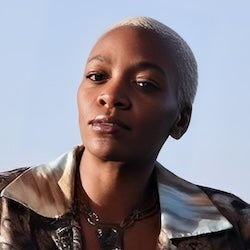
Nasheeka Nedsreal
Nasheeka Nedsreal is a multidisciplinary artist, dancer, and choreographer from Louisiana whose work blurs the boundaries between visual and performing arts. Her practice, deeply rooted in themes of identity, improvisation and experimentation, spans collage, sound, sculpture, video, textiles, and mask-making. Through these mediums, she explores the complexity of the body on stage, detaching it from forced perceptions and highlighting the contradictions within seemingly familiar images. Her art delves into the notion of play as essential to liberation and community-building, while also engaging with African futurism, glitch feminism, and speculative forms. Nedsreal's work has been featured in Sadler’s Wells, HAU Hebbel am Ufer, Saavy Contemporary, Kampnagel, Gallery Am Tacheles, Ballhaus Naunynstr. and many others. In 2023, her children's theatre performance, Flip Flop, earned the Berlin Ikaruspreis. She is a recent resident of Black Rock Senegal, a former member of the Schauspielhaus Zurich Dance Ensemble and co-founder of Soul Sisters Berlin. Her latest achievements include co-authoring a chapter in the book Plural Feminisms. Currently, she is on tour with choreographers Trajal Harrell, Ligia Lewis, and Jeremy Nedd. She is engaged in developing her own projects both as a solo artist and within various collectives.

Romina Chuls
Romina Chuls (1991, Lima) is a researcher and multidisciplinary artist. She holds an M.A. in Arts Politics from NYU Tisch School of the Arts. She also holds a Bachelor's in Fine Arts, with a major in painting, from the Pontificia Universidad Católica del Peru. Her work focuses on postcolonial gender issues in Peru and Latin America, topics related to androcentric memory, gender violence, and sexual and reproductive practices. In 2021 she was granted the AAUW International Fellowship to support her studies at NYU and her research on anti-colonial pregnancy interruption practices. Her solo shows include Parir los Pétalos (2023), an exhibition that articulates an understanding of abortion as part of a collective and more-than-human fertility cycle, at Real Art Ways, Hartford; Clandestinas (2020), a project that portrays the emotional stage of being pregnant with an unwanted being in a context where abortion is criminalized, at Galería Forum, Lima; and Tierra Incógnita (2017) at Fundación Euroidiomas, Lima. Her work has been shown in spaces such as Kunstraum (NYC, USA), at Palácio e Centro e Centro Cultural Vila Flor (Guimaraes, Portugal), at Museo de Sitio Julio C. Tello (Paracas, Peru) and Centro Cultural San Marcos (Lima, Perú). Romina has also led embroidery workshops as part of her project Qué rico menstrúo in Lima, Oaxaca, and New York.
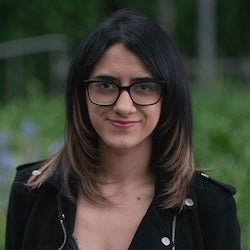
Sim Gill
Sim Gill is a doctoral student at the Annenberg School for Communication at the University of Pennsylvania. Her research interests concern the mediation of violence against women and girls as well as the negotiations between discourses of representation and affect that speaks to a broader shaping of a market for women's safety. Before joining Annenberg, Sim worked in the British Civil Service graduate program known as the Fast Stream. She received her BA in Politics, Philosophy and Economics from the University of Warwick and her MSc at the London School of Economics, where she specialized in Media, Communications, and Development. She can be reached at gillsim@upenn.edu.
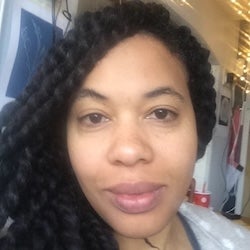
Sonia E. Barrett
Born in the UK of Jamaican and German parentage Sonia E Barrett grew up in Hong Kong, Zimbabwe, Cyprus and the UK. She studied literature at the University of St Andrews Scotland and her MFA at Transart Institute Berlin/New York. Her work unpacks the boundaries between the determined and the determining with a focus on race and gender. She makes sculptural works so she can run her hands along the fissures and manifest strategies for multiple compatible existences and mourn. Her sculptural practice includes placemaking with a view to assembling communities under the threat of climate change to (Re) claim space as well as instituting permanently. She also performs composites of plants, animals, elements and people to create interventions that presence their objectification and commodification, thinking about how to change perceptions of phenomena in “nature” that are a given. The work seeks to create new questions where there was a kind of certainty that has to do with the hegemony of normative western European values. Sonia is a MacDowel fellow and has been recognized by the Premio Ora prize, NY Art-Slant showcase for sculpture and the Neo Art Prize. Her work has been shown at a number of galleries, including Tate Britain, OCCCA California, the NGBK Berlin, Tete Berlin, The Format Contemporary in Milan and Basel. Her works have been published and written about in the International Review of African American Art, The British Art Studies Journal, Black History 365, Kunstforum International, Protocollum Journal, ELSE, Financial Times, Evening Standard, Open University Geography Textbooks and Contemporary & América Latina.
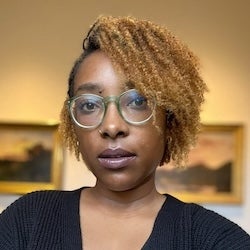
Valencia Washington
As a queer black woman living in the South, Valencia Washington navigates a unique intersection of identities that shape her experiences and perspectives. In Alabama, a place with a complex history and a diverse community, Valencia sees the power of art to bridge divides, create and reclaim spaces for marginalized voices to be heard. Through exhibitions, collaborations, and community engagement, Valencia is dedicated to creating platforms that amplify the voices of Black artists and create opportunities for dialogue, growth, and empowerment. Through volunteering at local organizations, advocating for social justice, & supporting marginalized communities, Valencia is committed to making a difference. By amplifying marginalized voices and fostering inclusivity, she aims to build a more equitable society where everyone feels seen, heard, and valued.
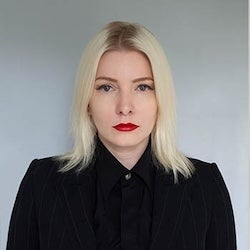
Wes Viz
Wes Viz is an interdisciplinary artist and creative director specializing in immersive art and world-building. A veteran in animation, her 15-year career has spanned commercials, music videos, and stage visuals. Her videos and projects have been featured in Creative Review, Kaltblut Magazine, Hunger and Paper Mag. She is also the creator of stage visuals for music artists such as Hozier and Biffy Clyro. Wes Viz’s art explores how emerging technologies shape our identities and mental states and how virtual environments will change how we perceive each other and ourselves. She is currently developing immersive art experiences in virtual reality to explore these themes further while continuing to work as a visual artist. She aims for her art to provide crucial commentary on our relationship with technology as a whole.
Yaré Colán
Yaré Colán (1995) is a Peruvian contemporary artist, activist, and cultural manager with a background in visual arts from the School of Fine Arts in Peru and currently pursuing a degree in Digital Arts from the University of Applied Arts in Vienna. She has participated in various collective and individual exhibitions in countries such as Peru, Colombia, Chile, Argentina, France, Mexico, and Scotland. Colán is part of the artivism platform "Somos 2074 and much more: for truth and justice for the victims of forced sterilizations" and has curated art exhibitions like "Crónicas de un cuerpo silenciado" and "La Herida In/visible" that denounce and raise awareness about the mentioned case. She has also produced local works like "Aparición" (Lima, 2023) by Guatemalan artist Regina José Galindo. Yaré's artistic work has received recognition, being a finalist for contemporary art awards such as the ICPNA Contemporary Art Award 2023 and the National Visual Arts Competition "Pasaporte para un Artista" by the Alliance Française in Lima.
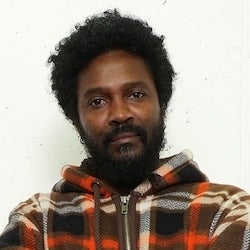
Zé de Paiva
Zé de Paiva deals with the decolonization of bodies on stage. He is part of and co-founder of the intercultural and interdisciplinary performance collective Syntax Schwarz. Not least in these collaborations, he deals with narratives from non-Western contexts in terms of content and aesthetics and places technology at the focus of the performative work: they pose questions about the politics of the creation and consumption of technology, but above all they bring technologies onto the stage as players. He placed the camera at the center of the performance, posed questions about image politics and developed new ways of appropriating cameras and images. He used capoeira as the basis for his movements. His long and intensive training in capoeira was and is fundamental to his work as an actor and performer. The practice of capoeira demands a level of attention and responsiveness that he finds incredibly fruitful for his stage presence. In the context of Syntax Schwarz, he has already begun to examine capoeira more closely for these purposes, developing “Syncope Motion”, which is the study of capoeira as a tool for performance (Photo Credit: Kathleen Kunath)
Zuha Nasim
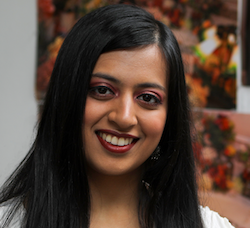
Zuha Nasim is a fine artist based in Philadelphia and New Jersey. Her interests lie in exploring interpersonal relationships and the body, through a medical and psychoanalytic lens. Her work engages both abstract and figurative form, aiming to encourage confrontation and reflection. She most often works with ink, oil painting, and photography to consider perception of self through varying levels of figurative intimacy. Her current works explore personal subconscious, memories, and contradictions within oneself. Her imagery often alludes to ritual and bodily contemplation. She considers the role of her Pakistani American identity in shaping her studio practice and views of gender identity.
"Present Futures: Experiments in Feminist Futurity" is sponsored by the Center for Collaborative Communication (C3), the Center for the Advancement of Global Communication (CARGC), and the Center for Digital Culture & Society (CDCS) at the Annenberg School as well as the Wolf Humanities Center, the Center for Latin American and LatinX Studies (CLALS), The Center for Africana Studies, The Center for Research in Feminist, Queer, and Transgender Studies, and Penn Global at the University of Pennsylvania.
Events
View AllDisclaimer: This event may be photographed and/or video recorded for archival, educational, and related promotional purposes. We also may share these video recordings through Annenberg's website or related platforms. Certain events may also be livestreamed. By attending or participating in this event, you are giving your consent to be photographed and/or video recorded and you are waiving any and all claims regarding the use of your image by the Annenberg School for Communication. The Annenberg School for Communication, at its discretion, may provide a copy of the photos/footage upon written request.
